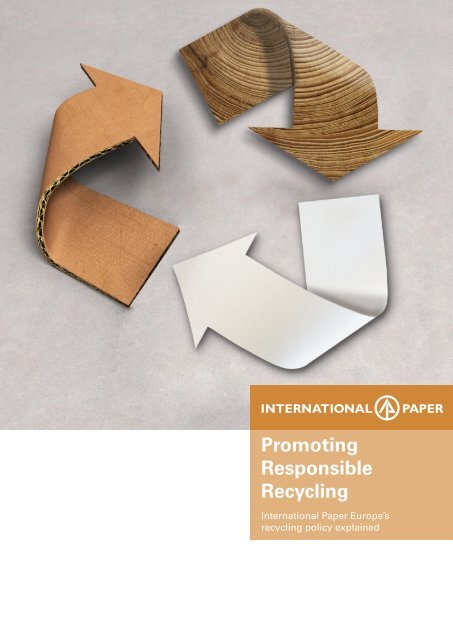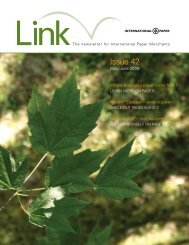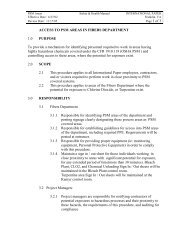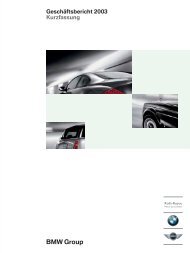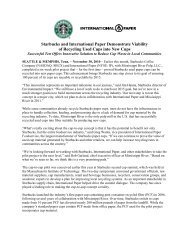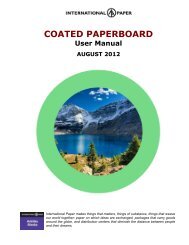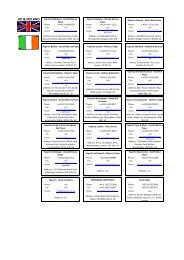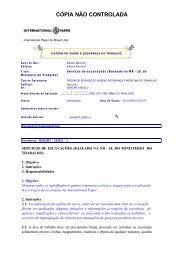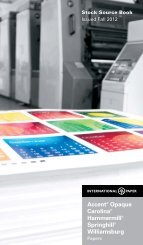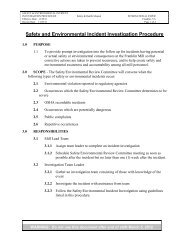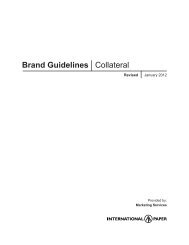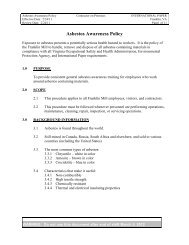Recycling Policy - International Paper
Recycling Policy - International Paper
Recycling Policy - International Paper
You also want an ePaper? Increase the reach of your titles
YUMPU automatically turns print PDFs into web optimized ePapers that Google loves.
Promoting<br />
Responsible<br />
<strong>Recycling</strong><br />
<strong>International</strong> <strong>Paper</strong> Europe’s<br />
recycling policy explained
� About 80% of paper and board produced can<br />
theoretically be collected once used. The remaining<br />
20% is either destroyed or transformed during usage<br />
(think of sanitary papers, cigarette paper or books<br />
in the library…).<br />
� Between 2004 and 2010 the paper recycling rate<br />
in Europe rose 10 percentage points.<br />
� By 2010, around 70% of all paper and board consumed<br />
in Europe was collected for recycling purposes and the<br />
trend continues to rise.<br />
� In 2010 about 50 million tonnes of paper was recovered<br />
in Europe for recycling.<br />
� Almost half the recovered paper stock in Europe is used<br />
for the production of packaging cases made, notably, of<br />
corrugated board.<br />
� The recycled content of European newsprint is about<br />
87.5% (as of 2009).<br />
� <strong>Paper</strong> fibres can be recycled about 5 to 7 times before<br />
they wear out.<br />
(Source: European Recovered <strong>Paper</strong> Council)<br />
1
2<br />
<strong>International</strong> <strong>Paper</strong> Europe<br />
and sustainability<br />
<strong>International</strong> <strong>Paper</strong> Europe is committed to delivering the products its customers want while ensuring<br />
responsible stewardship of the natural resources it uses today and in the generations to come.<br />
We take a sustainable approach to business that balances environmental, social and economic needs.<br />
We believe that this approach has served our company and society well in the past and we expect it will<br />
continue to do so in the future, which is why it is central to our business philosophy.<br />
In practice this means that <strong>International</strong> <strong>Paper</strong> Europe is committed to:<br />
� ensuring that the natural<br />
resources which are its vital<br />
raw materials are managed<br />
in a sustainable and<br />
responsible manner on an<br />
ongoing basis<br />
� ensuring that wherever<br />
and whenever appropriate<br />
it sources locally, thereby<br />
reducing the impact of raw<br />
material transportation on the<br />
environment while promoting<br />
economic development in<br />
local or neighboring<br />
communities<br />
� reporting transparently<br />
on how it manages its<br />
environmental footprint in<br />
Europe which it aims to make<br />
as sustainable as possible<br />
� supporting recycling of<br />
paper and packaging where<br />
it makes environmental and<br />
economic sense and is<br />
consistent with fitness for<br />
purpose of the product<br />
� building sustainability<br />
thinking and action into<br />
its product and process<br />
development and innovation<br />
� continuous improvement in<br />
regard to our environmental<br />
stewardship.<br />
� training its people to think<br />
and act sustainably every day<br />
� telling its own sustainability<br />
story to encourage others<br />
to take action to be more<br />
sustainable in their own<br />
sphere of influence<br />
�<br />
To <strong>International</strong> <strong>Paper</strong> Europe, sus-<br />
tainability simply means doing its<br />
business in a thoughtful and enlight-<br />
ened manner today and tomorrow,<br />
just as you’d expect it to do, because<br />
we only have one planet to live on.
<strong>International</strong> <strong>Paper</strong> Europe<br />
<strong>Recycling</strong> <strong>Policy</strong><br />
�Scope �Our<br />
beliefs<br />
<strong>International</strong> <strong>Paper</strong> Europe has developed this<br />
recycling policy to apply to its paper and packaging<br />
businesses in the locations where it manufactures<br />
and sells its products. Although the main focus of<br />
this policy relates to the use of recovered fiber and<br />
the collection and recycling of used paper, board<br />
and packaging, our philosophy is to recycle whatever<br />
we can within our manufacturing processes.<br />
<strong>International</strong> <strong>Paper</strong> Europe believes in the principle<br />
of reduce-reuse-recycle as an excellent general<br />
guideline for reducing waste and promoting the<br />
overall sustainability of society. It is natural, therefore,<br />
to apply this principle, as appropriate, to our own<br />
operations.<br />
We advocate recycling because we believe it ensures<br />
optimum use of precious resources – extending the<br />
useful life of raw materials – and reduces unnecessary<br />
landfill disposal. We use huge quantities of recycled<br />
fiber in some of our product manufacturing.<br />
However, we also believe that virgin and recycled<br />
papers complement each other and should not be<br />
viewed as competitors. The end user’s choice between<br />
products made of recycled and virgin fibers should,<br />
in most cases, be based on the particular application<br />
for the paper or packaging and the desired level of<br />
product quality. The use of recovered fiber in our<br />
product ranges reflects this.<br />
<strong>International</strong> <strong>Paper</strong> Europe believes that the best<br />
way to organize the collection and recycling of used<br />
paper and board (including used packaging) is in<br />
cooperation with all relevant players in the value<br />
chain. There is still a place, however, for special indi-<br />
vidual company effort where this is more effective.<br />
3
4<br />
�1<br />
Use of recycled material<br />
� Our policy<br />
<strong>International</strong> <strong>Paper</strong> Europe uses recycled material whenever it makes sense from a product quality,<br />
economic and environmental point of view.<br />
� What we do<br />
Virgin and recycled paper both have very good environmental credentials provided that the raw<br />
materials and the processes that are used for their production are managed responsibly. These<br />
materials complement each other, they do not compete.<br />
The key consideration is always that use of recycled fiber should be consistent with fitness for<br />
purpose of the product our customers require.<br />
<strong>Recycling</strong> is only one aspect of the environmental footprint of a product, and it should not come at<br />
the expense of other elements such as the carbon footprint, energy consumption or industrial<br />
pollution.<br />
It does not make sense to produce recycled paper if the recovered fibers have to travel long<br />
distances (thereby increasing the carbon footprint) while there is abundance of well-managed wood<br />
in the vicinity of the paper mill. Therefore, <strong>International</strong> <strong>Paper</strong> Europe uses recycled fibers where<br />
best suited for a product and if it results in a net environmental benefit.<br />
In practice we are a major user of recycled fiber and whole segments of our business depend<br />
on recycled fiber. Not surprisingly, therefore, we believe in recycled fiber totally.<br />
For example, we use around 500 kilotonnes of recycled paper and board every year for the<br />
production of corrugated boxes.<br />
Our commitment to the use of recycled materials goes beyond fiber. We also optimize the recycling<br />
of materials at every stage of our manufacturing process. Notably, we recycle 92% of the caustic<br />
soda used during paper-making. Although we borrow and reuse water in our processes, we return<br />
the vast majority of it to the Earth, at least as clean as when we extracted it.
�2<br />
Production of recycled grades<br />
� Our policy<br />
<strong>International</strong> <strong>Paper</strong> Europe produces recycled grades in line with the plant and machinery that we own.<br />
� What we do<br />
Across Europe, Middle East & Africa, <strong>International</strong> <strong>Paper</strong> focuses on the production of office and<br />
uncoated woodfree papers, industrial and consumer packaging, containerboard as well as coated<br />
and uncoated paperboard. Its offering also includes pulp and newsprint. Across this range we use<br />
recovered fibers in the most appropriate product applications and where our plant and machinery is<br />
equipped to use it effectively.<br />
For example, we produce 90 kilotonnes of container board and 120 kilotonnes of newsprint<br />
from 100% recycled fibers every year.<br />
For the important cutsize paper market (notably office or photocopy paper), the products demanded<br />
by the marketplace are manufactured using virgin fiber from responsibly managed forests (see our<br />
Wood Procurement <strong>Policy</strong> for more information). However, as mentioned earlier in relation to our<br />
overall usage of recycled materials as a multi-product company, the packaging business is characterized<br />
by its extensive use of recycled fiber (notably for manufacture of corrugated board cases).<br />
How Europe’s <strong>Paper</strong> Industry Shares Total Recovered Fiber<br />
Breakdown by Sector in 2010 (CEPI countries*)<br />
6.9%<br />
Household & Sanitary<br />
8.6%<br />
Wrappings, Other Packaging <strong>Paper</strong>s<br />
7.4%<br />
Carton Board<br />
18.5%<br />
Other <strong>Paper</strong>s<br />
18.5%<br />
Newsprint<br />
7.4%<br />
Other Graphic <strong>Paper</strong>s<br />
47.7%<br />
Case Materials<br />
* Member countries of CEPI (Confederation of European <strong>Paper</strong> Industries) are Austria, Belgium, Czech Republic, Finland, France,<br />
Germany, Hungary, Italy, The Netherlands, Poland, Portugal, Slovak Republic, Slovenia, Spain, Sweden, Switzerland, United Kingdom.<br />
5
6<br />
�3<br />
Waste paper collection<br />
where we manufacture<br />
� Our policy<br />
In locations where <strong>International</strong> <strong>Paper</strong> Europe has recycling operations, we directly drive and<br />
promote the local collection of waste paper.<br />
� What we do<br />
It generally makes best environmental and business sense to collect used paper as close as<br />
possible to where it will be used as recycled content. In line with our policy to use recycled<br />
fiber where it is best suited and where we have the plant and machinery to handle it, we make a<br />
dedicated effort to promote collection and recycling activities.<br />
For example, in Poland we are actively engaged in the development of the collection of used office<br />
and offset paper. We source waste paper from collection in small towns as well as large cities.<br />
By guaranteeing to buy this waste material from schools we encourage them to sort their waste<br />
paper pro-actively.<br />
The Company has triangular agreements in Poland between professional printers and waste collec-<br />
tion and management concerns whereby <strong>International</strong> <strong>Paper</strong> guarantees the purchase and use of<br />
the waste material collected. <strong>International</strong> <strong>Paper</strong> sponsors the national “Gold bale of recycled<br />
paper” award designed to recognize better recycling in Poland.<br />
In Morocco, we directly support the development of the paper collection system in the country<br />
by consuming 70% of the total volume of waste paper collected locally.
�4<br />
Waste paper collection where we sell<br />
� Our policy<br />
<strong>International</strong> <strong>Paper</strong> Europe promotes waste collection and recycling of paper and board through<br />
relevant trade associations in all countries where we sell products.<br />
� What we do<br />
The best way to organize the collection and recycling of paper and board is when all players in<br />
the chain mutualize their resources and set collective targets for the entire paper and board volume<br />
to be collected. In other words, the whole paper sector can achieve “more and better” when<br />
companies act together rather than alone.<br />
Together with other industry players in Europe, we support the European Declaration of <strong>Paper</strong><br />
<strong>Recycling</strong> which was adopted in September 2006 and set an industry goal to increase recycling<br />
rates to 66% ot total production by 2010. This aim has been overtaken, in fact; by 2010 around 70%<br />
of all paper and board consumed in Europe was collected for recycling purposes and the trend<br />
continues to rise. This performance leads the world and proves the success of the industry’s joint<br />
environmental effort in Europe.<br />
In practice, <strong>International</strong> <strong>Paper</strong> Europe financially supports the collection and sorting of waste<br />
paper and board through participation in the so-called “Green Dot” schemes for packaging<br />
recovery in France, Italy, Spain, Germany and the equivalent in the UK.<br />
In addition, we participate in the « REP » contribution scheme in France and the «VPR» contribution<br />
scheme in Germany.<br />
7
8<br />
<strong>International</strong> <strong>Paper</strong><br />
<strong>International</strong> <strong>Paper</strong> is a global forest products, paper and packaging company with primary markets<br />
and manufacturing operations in Europe, Russia, Asia, North Africa and, of course, North and Latin<br />
America.<br />
<strong>International</strong> <strong>Paper</strong> has a long-standing policy of using no wood from endangered forests.<br />
The company supports mutual recognition of forest certification standards. We have encouraged the<br />
adoption of CERFLOR, the SFI standard and other systems recognized by the global Programme for<br />
the Endorsement of Forest Certification (PEFC) council. It also sources from many forests certified<br />
under the Forest Stewardship Council (FSC) scheme.<br />
With almost 60,000 employees worldwide, the company has been No1 in the forest products sector<br />
eight times in nine years on Fortune’s magazine’s Most Admired Companies list.
Chaussee de la Hulpe 166<br />
1170 Brussels, Belgium<br />
TEL +32 (0)2 774 1211<br />
FAX +32 (0)2 774 1299<br />
www.internationalpaper.com/europe<br />
© 2011 <strong>International</strong> <strong>Paper</strong>


